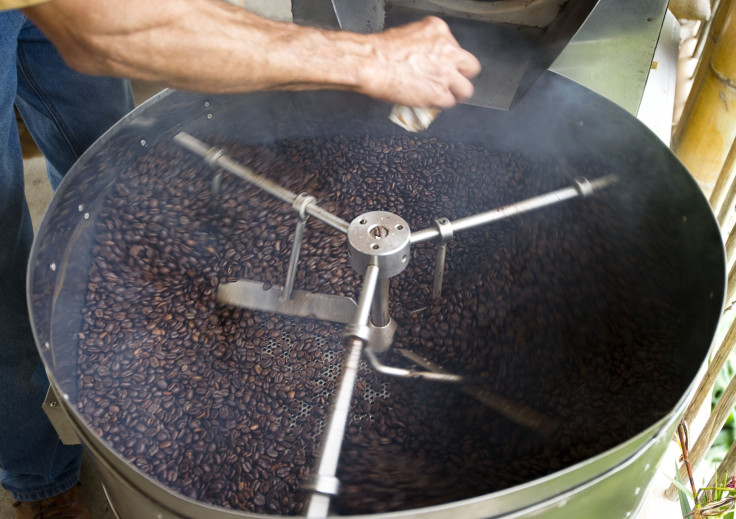Blockchain Insurance Could Save Coffee Industry In Latin America

After speaking with Howard Schultz before his departure from Starbucks earlier this year, Time magazine warned: “Your morning cup of coffee is in danger. Can the industry adapt in time?” With 40 years in the industry, Schultz had no doubt about the most urgent threat for the precious crop: climate change.
Higher temperatures and intensified droughts are making coffee increasingly difficult to grow, which leads to higher prices. Nearly 50 percent of the land used worldwide to produce high-quality coffee could be barren by 2050, a study published in Climatic Change journal found. That number, according to the U.S. National Academy of Sciences, could reach as high as 88 percent in Latin America.
This could be catastrophic for the region. Coffee is Latin America’s most important agricultural export, representing one-third of all agricultural trade. An estimated 800,000 people are employed by the industry in the region, with Brazil, Colombia and Peru ranking among the top 15 coffee exporters in the world.
Governments, local coffee associations and farmers are scrambling to find solutions while a global coffee shortage looms amid skyrocketing demand. The industry is spending millions in research, improving seeds, soils and agricultural practices to adapt over time. But key to securing the industry’s future is a new kind of insurance that effectively helps preserve small family farming businesses in the face of the weather’s perils. For the first time in history, an emerging technology is paving the way for microinsurance to be deployed in developing countries. That unprecedented powerful tool is blockchain.
Blockchain is the technology behind bitcoin, the pioneer of digital coins. We can use that same technology to offer innovative solutions — not only to improve current financial processes, from trade to banking, but we can also revolutionize industries we thought impossible to update and critical for low-income populations: insurers.
Evidence, from World Economic Forum's studies to non-profit organizations' field experience, supports access to financial services as a great tool for fighting inequality. Several developing economies have already perceived the benefits of micro-lending, rural/communal banking and micro-remittances platforms, in some cases achieving impressive success thanks to a booming connectivity in the world. In comparison, insurance for small farming businesses, which has the potential to significantly aid millions of poor families, has received limited, if any, attention. Why?
The crude reality of insurance
The reasons are multiple and complex. On one side, traditional insurance products are too complex and expensive for most families in developing economies. On the other side, some markets are not profitable enough for traditional insurers. Just processing and executing a claim can be more expensive than the actual claim amount.
Latin America is a perfect example. Sixteen Latin American countries are considered to be emerging markets by the World Bank; all except Brazil have larger unbanked populations than banked and the region has one of the world’s lowest insurance rates, according to Spanish blue-chip insurer Mapfre’s research unit. Despite the painfully obvious socio-economic need for families and the potential risks for the national economies, most financial institutions are not adequately incentivized to serve the poor.
Not even the specific designed products such as insurance for small businesses have achieved limited commercial viability, and the figures speak for themselves. Only 51.5 million people in Latin America, or just 8 percent of the population, have some kind of insurance, leaving an untapped potential market of 350 million people uninsured, estimates the MicroInsurance Network.
We know from our extensive experience working on the ground that the best way to provide insurance coverage to small-scale farmers and informal workers is by partly eliminating their need to pay for it. And for achieving that, we have to provide the appropriate incentives for retailers, consumers, policymakers and donors. How?
The answer lies with blockchain and more specifically with how this technology enables insurance companies to design innovative products addressing these problems in ways we couldn't previously imagine. For instance, it allows the efficient handling of high volumes of small claims at very low costs. It can also speed up the compensation process. So, if catastrophe strikes, low-income families can actually feel the real benefits of being insured and the sector can get back on its feet faster.
At Etherisc, we are building a platform to provide collective, transparent and decentralized “risk pools” where corporates, governments, non-profits and producers can share the risk in an inclusive way, benefitting and protecting the whole value chain. From crop insurance to hurricane protection, from flight delays to social security, we have the opportunity to spread fair and accessible insurance all over the world.
If catastrophe strikes, blockchain-powered smart-contracts will be activated as agreed by the risk poolers and the payments will be unlocked without burdensome red-tape or costly drawn-out processes. This, in turn, allows the producers to get back to their work of growing coffee straightaway, reducing the impact on the whole industry and all the while protecting its most vulnerable and valuable sector.
The aspiration of farmers shouldn't be just to survive, but rather to thrive, knowing they have effective insurance for their crops amid climate change. And that’s how — with blockchain — we can save coffee.
Michiel Berende is the inclusive insurance lead at Etherisc, a decentralized insurance protocol to collectively build insurance products.
© Copyright IBTimes 2024. All rights reserved.





















